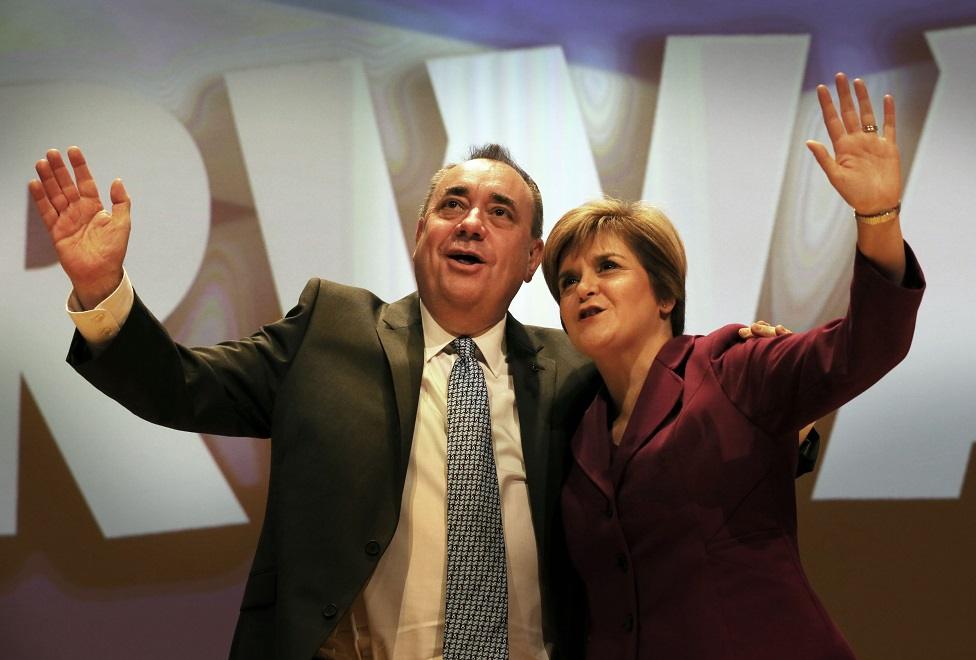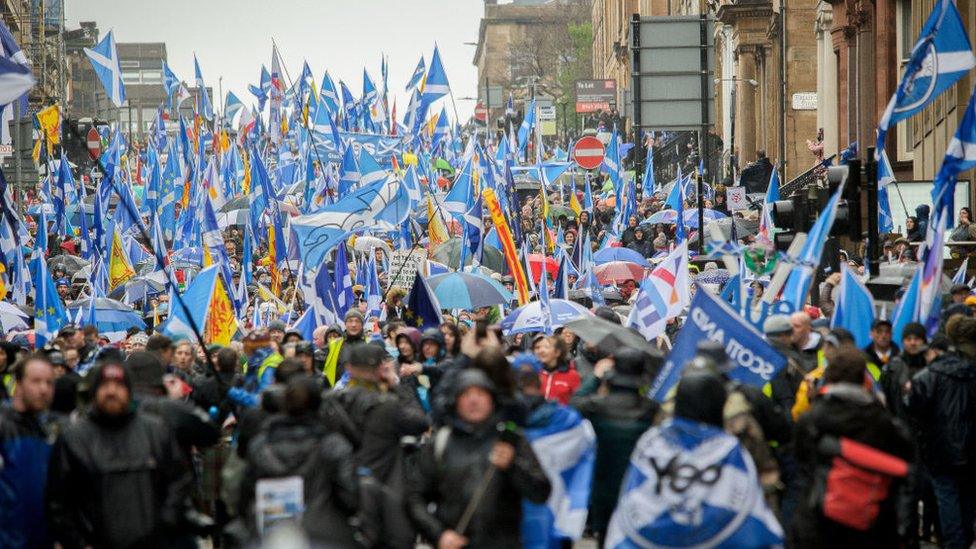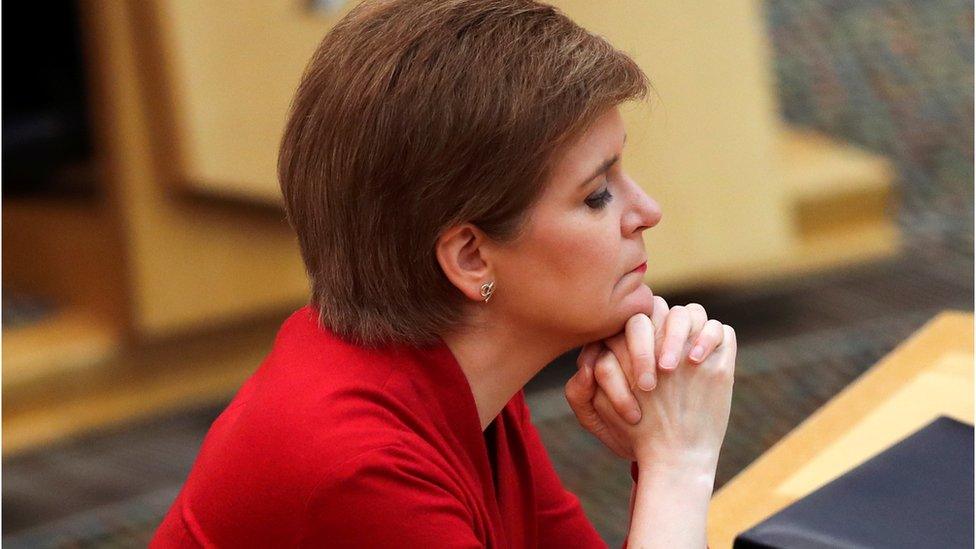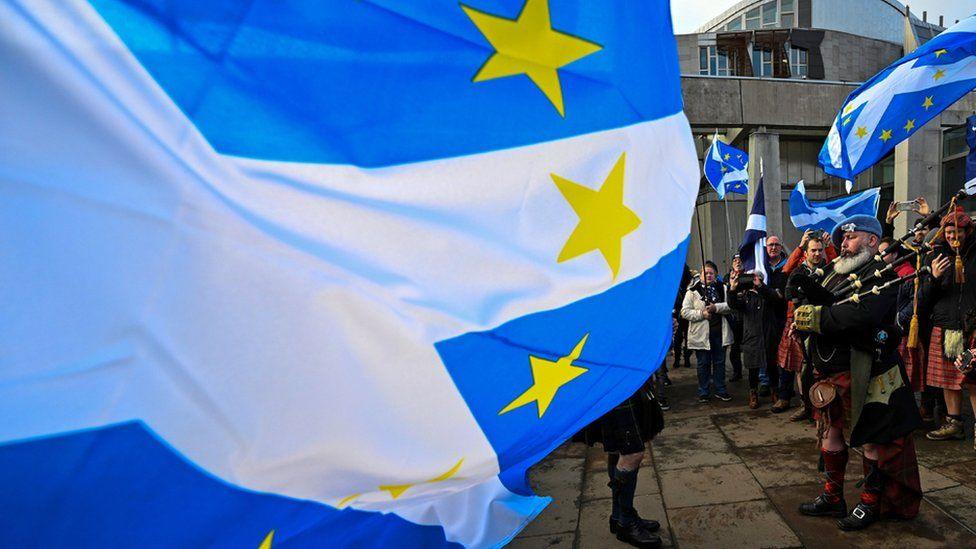Has support for the SNP and independence slipped?
- Published

Support for the SNP and for independence has been falling in recent polls - albeit from previously high levels.
Inevitably this trend has fuelled speculation that the former first minister's attack on the Scottish government's handling of the harassment allegations against him has done significant damage to the SNP's popularity.
However, whether there is any connection between the two is - so far at least - far from clear.
On average the last four polls last year put support for independence on 56%. Now the most recent readings (from the same four companies) suggest the figure is a more modest 52%.
Meanwhile, the equivalent comparison suggests that SNP support (on the constituency vote) has slipped from 54% to 52%.
These latest figures still suggest that the SNP are on course to win an overall majority in May's Holyrood elections, and that Yes would be narrow favourites to win any subsequent independence referendum. But in both cases the margin between '"success" and "failure" is now quite narrow.
The prospects for May's election - and the constitutional debate thereafter - could begin to look very different if support for the SNP and for independence were to fall much further in the polls.

Polls suggest support for Scottish independence has fallen slightly
But why might the fall so far not have been occasioned by the row with Mr Salmond?
The first signs that support was falling began to appear early in the new year - well before the harassment allegations inquiry started to hit the media headlines.
Meanwhile, although some are inclined to believe Mr Salmond's side of the story, so far there is only limited evidence that the crossfire has undermined support for the party or Ms Sturgeon among the party's core supporters.
According to Survation, 20% of those who voted for the SNP in 2019 believe that the SNP and the Scottish government were engaged in a plot to damage Mr Salmond's reputation, while 21% believe that the Scottish government has been involved in a cover-up of its handling of the issue.
Those figures tally with Ipsos MORI's finding that 21% of 2019 SNP voters say they now have a less favourable view of the SNP in the wake of what they have heard about the inquiry.
However, these views are very much a minority perception among SNP supporters, who seem inclined to stick with the party and its current leader.
As many as 92% of 2019 SNP voters recently told Ipsos MORI that they are satisfied with the job that Nicola Sturgeon is doing as first minister - unchanged from last November. Equally ComRes have found no decline since December in the proportion (86%) who hold a favourable view of the First Minister.
According to Survation, 94% of 2019 SNP voters say they will vote for the party again, the same as in November. At 92%, the equivalent figure in Ipsos MORI's poll is only slightly down on the 95% who said in November they would back the party again.
However, to win an overall majority in May - or a referendum at any point thereafter - the SNP will have to do more than retain the support of those who have backed it before. It will need to gain converts.

Nicola Sturgeon has received widespread support for her handling of the Covid pandemic.
Much of the rise in support for independence last year - and with it backing for the SNP - seems to have arisen because many voters, including above those not previously supportive of the SNP or of independence, reckoned that Nicola Sturgeon was handling the pandemic much better than Boris Johnson. Not least of the reasons was that her more cautious approach to easing lockdown restrictions seemed closer to the mood of voters.
But that perception is now not so widespread. In line with other polling, Ipsos MORI have reported a five-point drop (from 73% to 68%) since last November in the proportion who say that the Scottish government has handled the pandemic well. Crucially, all of that drop occurred among those who did not back independence in 2014.
Meanwhile, although according to Survation most voters say that Ms Sturgeon's proposal that most shops should not reopen until late April is about right (44%), more say it is too late (29%) than feel it is too early (17%). Those who voted No at the last independence referendum are especially likely to say it is too late (37%).
At the same time, a majority (57%) believe that the timetable should be revisited if the vaccine has a big impact on the numbers ending up in hospital.
The swing towards the SNP and independence that occurred at the height of the public health crisis is, it seems, not guaranteed to be durable as and when the pandemic comes to an end.
John Curtice is Professor of Politics, Strathclyde University, and Senior Research Fellow, ScotCen Social Research, external and 'The UK in a Changing Europe'.
- Published26 January 2021
